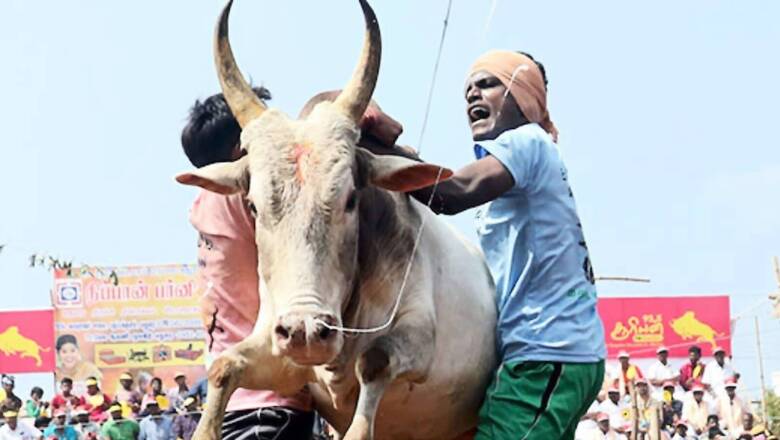
views
Jallikattu, the traditional bull-taming sport of Tamil Nadu, holds a long history. Jallikattu, otherwise known as ‘Eru Thazhuvuthal’ (Bull Embracing) is a sport that has been played in Tamil Nadu during Thai Pongal since the Sangam Period.
In May 2014, the Supreme Court banned Jallikattu based on pleas by the Animal Welfare Board of India and People for the Ethical Treatment of Animals (PETA). But the massive protest organised by the people of Tamil Nadu, referred to as the ‘Jallikattu Uprising’, forced the Indian government to clear the Ordinance proposed by the Tamil Nadu government and an order was issued in January 2017, as an attempt to preserve the cultural heritage of Tamil Nadu and ensure the well-being of native breeds of bulls. After the order, many restrictions were imposed for the safe conduct of the bull sport as well.
Accordingly, like in past years, this year Jallikattu began at various places with Covid-19 restrictions in Tamil Nadu from January 15 during the start of Thai Pongal on January 14. This sport predominantly happens at important places like Avaniyapuram, Palamedu and the world-famous Alanganallur, all in Madurai district. Meanwhile, Jallikattu events are also conducted on small scales across the State. Out of 37 indigenous cattle breeds in India, a large number come from Tamil Nadu. These include Pulikulam, Kangeyam, Umbalachery and other breeds.
Out of these, the Pulikulam cattle breed, the name derives from Pulikulam village located in Sivaganga district of Tamil Nadu, is an indigenous breed and popularly used in Jallikattu. It is considered to be one of the drought-resistant breeds. According to Rajasekaran, coordinator of Jallikattu Peravai in Madurai said, “In native breeds, many breeds have extinct and maximum of only four breeds are present now. In Jallikattu, mostly Pulikulam breed has been used up to 90 per cent. Secondly, the Kangeyam, which are mostly uncommon in Jallikattu these days. Thirdly, Umbalachery breeds are commonly seen in Thanjavur, Ariyalur district and they also make rare participation in Jallikattu.”
Interestingly, Rajasekaran said Pulikulam bulls are the ‘King’ of Jallikattu for their raging and aggression. Other breeds are common only in their concerned regions. All the three prize winning breeds of Jallikattu (Alanganallur, Avaniyapuram and Palamedu) in 2022 were Pulikulam breeds. Generally, these breeds are not maintained at home, he said.
“This breed is resistant to brucellosis and foot-and-mouth diseases. Eventually, the male bulls will be dark grey while the females will be grey or white. The bulls are aggressive and have the power of endurance, while they are very vigorous and strong. Apparently, the price of a 6-month-old male calf would be over Rs 30,000. If a mature bull is undefeated in Jallikattu, its price could go up to Rs 5.50 to 6 lakh. Surprisingly, post-Jallikattu protest, the Pulikulam breed became popular across the country and many began to grow the breed. In the meantime, bulls can be rarely seen across Coimbatore and Tiruppur districts. Whereas, nowadays, people of these regions show interest in the breeding of bulls, which led to the protection of breeds from being extinct. Subsequently, there are 850 bulls maintained exclusively for Jallikattu within Madurai corporation,’ Rajasekaran said.
It is said that a few centuries back, the village derived its name ‘Pulikulam’ (Tiger Pond), because of the presence of tigers in the dense forests that used to quench their thirst in the village pond. It is also said that the bulls of the village were capable of fighting ferociously with tigers and later the name was derived. Pulikulam is a drought-resistant breed and is used as a draught breed rather than milk production as the yield is less compared to other breeds. It supplies good muscle power for ploughing the land, thus contributing to significant organic farming in Tamil Nadu.
According to a report, in 1995, the Pulikulam breed’s population was found to be around 1 lakh, which has come down drastically to about 16,000 animals in and around Madurai district during 2019. In the past, the Yadava community and Mukkulathor community mostly grew the Pulikulam breed. But now, the trend has changed. Many people of different communities rear this breed for the sake of Jallikattu as it is considered to be a prestigious sport. In no doubt, this indigenous sport considered to be a sign of bravery has helped the survival of the rare Pulikulam breed not only in Tamil Nadu but across India.
Read all the Latest India News here




















Comments
0 comment